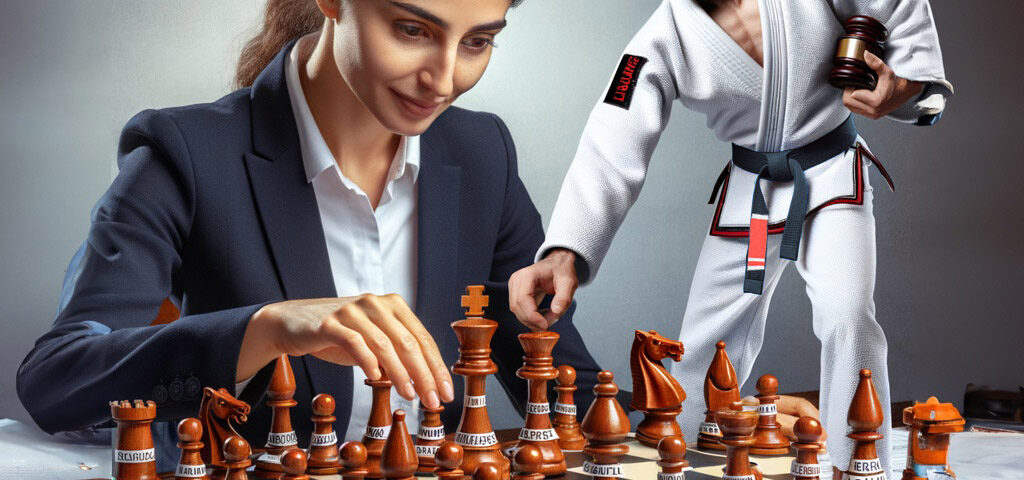Brazilian Jiu-Jitsu (BJJ) is a self-defense martial art developed in Brazil by the Gracie family which is well known for its emphasize on leverage, technique and strategy over brute force often referred to as “Human Chess”. As litigation partner in the office of Afik & Co. and a practitioner of BJJ since 2018, I see a lot of resemblance between BJJ principles to the world of litigation, where “battles” are fought in courtrooms (with legal suites instead the traditional Gi) and legal strategies are akin to tactical maneuvers on the mat. I find that the principles of BJJ provides valuable insights for effective management of a legal litigation procedure, such as the following:
Leverage Strategic Thinking: BJJ practitioners employ strategic thinking to outmaneuver opponents and gain positional advantages. Likewise, in litigation, strategic planning is paramount. Lawyers must anticipate their opponent's moves, identify weaknesses in their case, and capitalize on opportunities to strengthen their own position. Like a skilled BJJ practitioner who thinks several steps ahead and foresees possible outcomes beforehand, an experience legal practitioner can formulate effective strategies which position the client on the path to success. Thus, for example, filing a motion for temporary relief, even if the matter is relatively marginal to the conflict, may lead to a quick hearing before a judge and a questioning of a lead witnesses long before the hearing of the main case. In some cases, this preliminary move can set the ground for the main case and even settle it.
Position Before Submission: In BJJ, a correct offensive move to subdue the opponent begins first and foremost with establishing a position that allows control over the opponent (such as locking the shoulders, back, side, etc.). Taking an offensive move recklessly may lead to the loss of the position and the failure of the move to subdue the opponent. Similarly, when properly conducting a legal proceeding, it is vital to strive to conduct the legal proceedings from a position of control before making any 'legal submission'. Even the dispatch of a letter may reveal the legal position and allow the other party to make improvements or cover up traces. Other issues to be considered before the first move can be whether there is a place from which it will be possible to manage the conflict from a more favorable position (such as: local jurisdiction versus international one, Court versus an arbitration, etc.) and issues of timing (for example, certain circumstance may incentivize a settlement). Therefore, there is room to premeditate before any legal procedure and consider which steps can be initiated and may improve or establish the controlling legal positioning. In our office, before even sending a formal letter, we consider the legal implications and prepare a table of strengths and weaknesses as well as consider whether there is enough evidence to substantiate the claim or defense and what actions can be taken to strengthen the contentions.
Focus on Technique: Just as mastering technique is fundamental in BJJ, lawyers must possess a deep understanding of legal principles, precedents and the relevant procedural rules and – just like BJJ practitioners – must at all time keep ‘rolling’ and be up to date. By focusing on the finer details, skilled lawyers can execute strategies with precision and more effective manner and by that increase their chances of success in the courtroom. In our office lawyer never cease to study (as part of the weekly training program – every week, all year-round, every year) because a skilled lawyer who is familiar with recent caselaw will be able to maneuver the legal strategy wisely at the get go where a lawyer who is blindly throwing punches in the air, and (if at all) does the legal research only at the stage of the closing arguments.
"Flow with the Go": In BJJ, "flow" refers to the seamless transition between techniques and movements. The common term "to flow" may seem in the public eye as indication to passivity, but BJJ actually teaches to adapt to the opponent's movements and capitalize on openings to proactively make accurate offensive moves. Similarly, in litigation, being adaptable is crucial. Legal proceedings can take unexpected turns, requiring swift adjustments in strategy. By staying knowledgeable, agile and open-minded, our teams can effectively respond to changing circumstances and gain an advantage over our adversaries. For example, a skilled litigation lawyer conducting a cross-examination will listen carefully to the spontaneous answers of the witness and will know how to leverage this when necessary, and at the appropriate timing, while maintaining the momentum of the line of questioning. On the other hand, a lawyer who conducts the investigation of the witness in a fixated way and without proper acquaintance of the legal material and the facts of the case, moving from question to question and from topic to topic in a technical manner, may miss golden opportunities that come his way.
Just as Brazilian Jiu-Jitsu practitioners strive for mastery on the mat, a good attorney can strive to excel in the courtroom by applying similar principles and using them to confidently conduct litigation and achieve positive outcomes for their clients. Thus, when you seek a litigator, perhaps not only should you enquire how much updated caselaw did he read this week, but also whether he masters the secrets of the art Brazilian Jiu-Jitsu. OSS!

